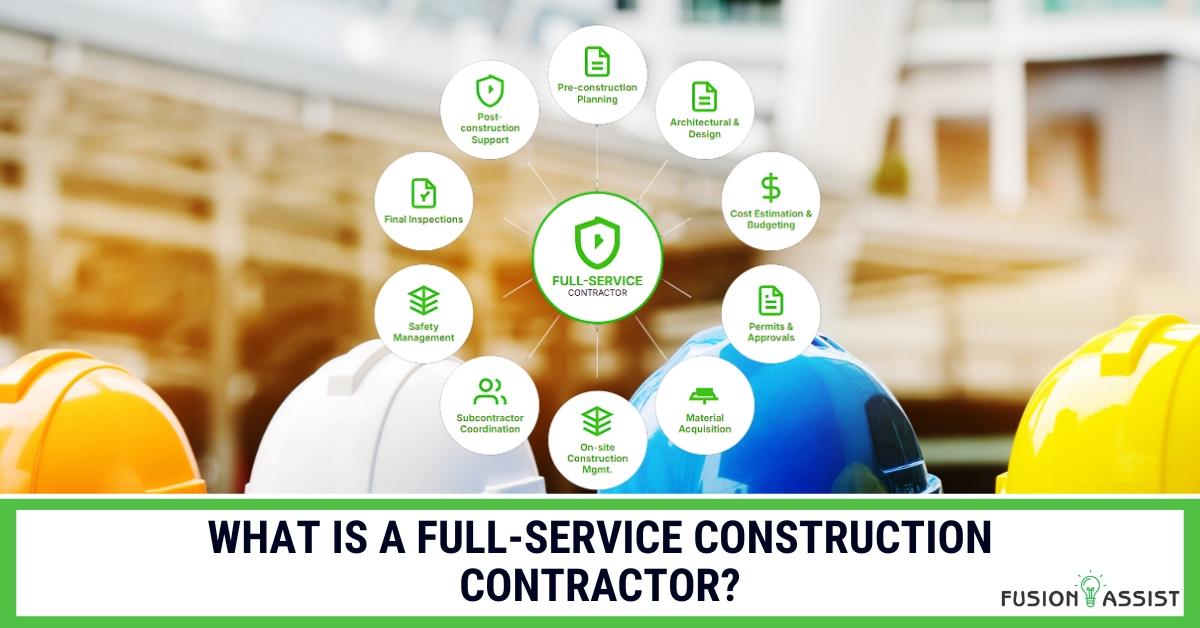Introduction
The construction industry is undergoing a major transformation fueled by the demand for faster project timelines, cost efficiency, and higher-quality outcomes. Amid this evolution, the role of a full-service construction contractor has become increasingly essential. These contractors provide a streamlined construction process, managing everything from design and permitting to procurement, construction, and post-completion services.
Rather than juggling multiple vendors, hiring a full-service contractor offers a one-stop solution for executing construction projects efficiently. In this comprehensive guide, we delve into the myriad benefits of choosing a full-service construction partner, supported by real-world examples from Fusion Assist, a top-tier provider of BPO services tailored for the construction industry.
What is a Full-Service Construction Contractor?
A full-service construction contractor is responsible for overseeing the entire lifecycle of a construction project. This includes:
Pre-construction planning
Architectural and structural design
Cost estimation and budgeting
Procuring permits and regulatory approvals
Material acquisition
On-site construction management
Subcontractor coordination
Safety management
Final inspections
Post-construction support and warranty
Unlike traditional construction firms focusing solely on the building phase, full-service contractors integrate all moving parts, ensuring a cohesive and collaborative approach to delivering your project.
The Strategic Benefits of Hiring a Full-Service Construction Contractor

Streamlined Construction Process and Project Management
One of the most compelling advantages of a full-service contractor is the streamlined construction process. By consolidating all services under a single provider, project coordination becomes exponentially more efficient.
This structure eliminates delays caused by miscommunication between separate entities (e.g., designers and subcontractors). It also allows the contractor to oversee every stage, ensuring each phase complements the next, reducing redundancies and improving timelines.
Cost Savings and Budget Control
Many clients mistakenly believe hiring a full-service contractor is more expensive. In reality, the construction cost savings are substantial when you factor in the value of accurate budgeting, bulk material purchasing, and reduced change orders.
Full-service contractors have well-established supplier networks, allowing them to procure materials at competitive prices. Additionally, their integrated teams reduce the chance of costly design conflicts, helping clients stay within budget.
Faster Project Delivery and Reduced Delays
Time is construction money. Delays can lead to higher costs, frustrated stakeholders, and missed opportunities. Full-service contractors excel at fast construction project delivery by controlling schedules, managing suppliers, and swiftly resolving on-site challenges.
This integrated project delivery model results in fewer bottlenecks, ensuring projects are completed within the desired timeframe, even ahead of schedule in many cases.
Enhanced Quality Assurance and Accountability
When multiple parties are involved, accountability can be diluted. With a full-service contractor, there’s a point of responsibility. This clarity ensures better construction quality assurance, as the contractor is directly responsible for the process and the outcome.
Full-service firms often implement in-house quality audits, continuous training, and standardized procedures to maintain consistent quality.
Simplified Regulatory Compliance
Navigating building codes, zoning laws, and environmental regulations can be complex. A full-service contractor typically has a team dedicated to building permit management and compliance.
Their familiarity with local and regional regulations helps prevent costly penalties or project shutdowns. Handling all documentation and liaising with authorities makes the construction compliance services seamless for the client.
Customized Construction Solutions
Every project is unique, and cookie-cutter approaches rarely yield optimal results. A full-service contractor provides custom construction solutions tailored to clients’ sites and project goals.
They work closely with the client from concept to completion, ensuring that the project remains efficient.
Proactive Risk Management
Construction involves many risks, including labor shortages, material price volatility, safety hazards, and scheduling issues. Full-service contractors are well-equipped to offer risk mitigation strategies.
Being involved in every stage, they anticipate problems early and resolve them before they escalate. Their in-house safety officers and real-time reporting tools also foster safe construction practices, protecting workers and clients.
Comprehensive Post-Construction Services
After the ribbon is cut, the work isn’t over. Full-service contractors offer post-construction services, including maintenance, repair, and warranty support.
These building maintenance support programs ensure your investment is protected and any issues are addressed promptly, without the hassle of sourcing new vendors.
Fusion Assist: Empowering Full-Service Contractors Through Expert Support

Fusion Assist is a renowned BPO provider supporting full-service construction contractors across North America. Their specialized services enhance contractor efficiency by offloading non-core tasks like:
Construction Estimation
Document & Permit Management
Customer Service & Scheduling
BIM Modeling and CAD Drafting
Compliance Reporting & Safety Logs
Integrating Fusion Assist, sectors can focus more on field operations while enjoying better cost control and operational agility.
Real-World Case Studies: Full-Service Construction Powered by Fusion Assist
Case Study 1 – Residential Development in Houston, Texas
50-Unit Townhouse Community | Regional Real-Estate Developer
Background & Challenge
Houston’s housing market was booming, but the developer’s previous townhouse projects had overrun by an average of 12 weeks and blown budgets by nearly 18 percent. Fragmented subcontractor teams, late permit approvals, and a lack of transparent cost data created a domino effect of delays and change orders.
Why the Developer Chose a Full-Service Contractor + Fusion Assist
The leadership team wanted one accountable partner to manage everything—from pre-construction design through resident handover—while Fusion Assist supplied the BPO horsepower behind the scenes. Key selection criteria were:
Accurate construction estimation (the developer had been caught off guard by price spikes in lumber and drywall).
End-to-end permit coordination with the City of Houston’s Planning & Development Department.
Proactive resident communication to nurture presales and maintain goodwill once buyers move in.
Fusion Assist’s Integrated Scope
| Phase | Fusion Assist Deliverables | Impact |
|---|---|---|
| Pre-construction | 3-tier cost model, value-engineering suggestions, risk register | Reduced baseline budget by 8 % before ground-breaking |
| Permitting | Digitized drawings, e-submittals, and weekly status calls with city reviewers | Permit cycle cut from 10 weeks to 6 |
| Construction | Live dashboard for schedule, procurement, RFIs; on-call QS team to validate change-order pricing | Prevented $480k in scope creep |
| Customer Support | 24/7 virtual helpdesk, move-in surveys, warranty ticketing | 92 % buyer satisfaction at 12-month mark |
20 % faster completion (16 months vs. 20 months planned).
30 % cost reduction against the developer’s historic benchmark—driven by bulk-buy materials, precise take-offs, and fewer reworks.
Zero compliance violations even as Houston tightened stormwater regs mid-project.
Lesson Learned
Centralizing estimation, permits, and homeowner communication under one umbrella eliminated the finger-pointing that had plagued earlier builds and freed the developer to focus on sales and land acquisition.
Case Study 2 – State-Wide Retail Expansion in Florida
Five New Stores | National Big-Box Chain
Background & Challenge
The retailer faced aggressive board pressure to open five identical 38,000 sq ft stores before the holiday shopping season. Florida’s dispersed sites—Miami, Orlando, Tampa, Jacksonville, and Pensacola—meant different inspectors, hurricane-zone wind loads, and supply-chain volatility just as fuel prices spiked.
Integrated Solution
Centralized scheduling & logistics – Fusion Assist created a master critical-path schedule with site-specific float allowances, feeding live updates to the full-service GC’s field superintendents via a mobile app.
Subcontractor contract management – All trade bids were templated, digitally signed, and version-controlled in Fusion Assist’s document vault, reducing award time by 37 percent.
Conflict-free BIM models – The BIM team produced LOD-350 models that auto-flagged MEP clashes, eliminating drywall re-work and change-order battles.
Operational Highlights
A rolling procurement plan locked in HVAC units and roofing membranes early, sidestepping hurricane-season shortages.
Permit reviewers in five jurisdictions received identical digital submittal packages, creating a repeatable “rubber-stamp” effect.
Fusion Assist’s customer-service agents fielded 2,400 community inquiries about job opportunities and store-opening dates, preserving the retailer’s brand image while the GC stayed laser-focused on construction.
Results
100 % on-schedule openings—all five ribbon-cuttings happened within the same week, two days ahead of Black Friday merchandising.
Permits processed 40 % faster than the chain’s previous Florida buildouts.
15 % overall cost savings, largely from shorter equipment rentals and avoided overtime.
Lesson Learned
By marrying full-service site execution with Fusion Assist’s back-office rigor, the retailer converted an ambitious timeline into a repeatable, data-driven rollout template for the next 20 stores.
Case Study 3 – LEED-Gold Industrial Warehouse, California
100,000 sq ft Distribution Hub | West-Coast Logistics Firm
Background & Challenge
California’s Title 24 energy code, aggressive carbon targets, and a client-mandated LEED-Gold goal raised the compliance bar. At the same time, e-commerce demand forced a six-month schedule compression so the warehouse could launch ahead of peak holiday shipping.
Fusion Assist’s Sustainability & Compliance Engine
| Workstream | Action | Benefit |
|---|---|---|
| LEED Strategy | Produced a credit scorecard, prioritized daylighting, recycled-content steel, and low-VOC finishes | Secured enough credits for Gold with a 7-point buffer |
| Documentation | Cloud-based binder of product cut-sheets, MSDS, waste tickets, commissioning reports | The inspector had zero RFI hold-ups |
| Safety & Audits | Weekly drone fly-overs; real-time PPE compliance metrics | Recordable incident rate of 0.0 |
| Procurement Tracking | The dynamic dashboard flagged long-lead items (HVLS fans, PV inverters) | Enabled early buyout, beating inflationary price jumps |
Key Execution Milestones
Week 4: Slab-on-grade poured; Fusion Assist submitted first LEED progress packet, shaving two review cycles.
Week 9: Pre-fabricated steel arrived when foundation cure reached 3,000 psi, eliminating lay-down delays.
Week 20: Photovoltaic array commissioned; utility interconnect paperwork pre-approved thanks to Fusion Assist’s liaison with PG&E.
Results
25 % shorter build (24 weeks vs. 32 weeks baseline) without premium overtime.
LEED-Gold Certification was achieved on the first submission; no clarifications are required.
Seamless final inspection; authorities granted immediate certificate of occupancy, enabling same-day inventory stocking.
Lesson Learned
With Fusion Assist owning the paper trail and sustainability analytics, the full-service contractor could “swing hammers” uninterrupted, proving that aggressive green goals and speed-to-market are compatible when documentation, procurement, and safety are fully integrated.
Cross-Case Takeaways for Developers and Contractors
Unified Accountability: A single, full-service construction contractor paired with Fusion Assist eliminates multi-vendor silos.
Data-Driven Decisions: Real-time cost, schedule, and compliance dashboards transform gut-feel management into proactive control.
Scalability: Whether multiplying retail footprints or rolling out green warehouses, the full-service + BPO model scales without sacrificing quality or brand standards.
These deep-dive case studies demonstrate how Fusion Assist empowers full-service contractors to deliver faster, leaner, and greener projects, turning complex builds into competitive advantages for every client.
Emerging Trends Supporting Full-Service Construction
Digital Transformation
Adopting AI-driven project scheduling, drone site monitoring, and mobile field apps is transforming how full-service contractors operate. These tools improve transparency, reduce downtime, and boost on-site productivity.
Modular and Offsite Construction
Full-service contractors are responsible for modular buildings and off-site construction, which enable faster construction with less environmental impact. These methods require meticulous coordination, which these contractors excel at.
Green Building and Energy Efficiency
There is a growing demand for sustainable buildings. Full-service contractors are better equipped to manage energy modeling, sustainable material sourcing, and LEED certification.
FAQs
1. What makes a full-service contractor different from a general contractor?
A general contractor typically focuses on physical construction. A full-service contractor handles everything—design, planning, construction, and support services—offering a more integrated solution.
2. Is hiring a full-service contractor more cost-effective?
Yes. While initial costs may appear higher, long-term savings are realized through better project coordination, fewer delays, and reduced rework.
3. Can full-service contractors handle multiple large-scale reworks?
Absolutely. Especially when supported by BPO firms like Fusion Assist, full-service contractors can easily manage complex, multi-location developments.
4. How do full-service contractors ensure quality control?
They use in-house quality management systems, conduct regular site audits, and employ standardized practices to maintain high standards across all project phases.
5. How does Fusion Assist support contractors?
Fusion Assist offers services like estimation, BIM modeling, permit support, compliance documentation, and virtual client service—all of which enhance operational efficiency.
Conclusion
Hiring a full-service construction contractor is more than a convenience—it’s a strategic investment in project success. From custom construction solutions to post-construction services, these contractors offer a complete package designed to deliver projects on time, within budget, and to the highest standards. When paired with specialized BPO partners like Fusion Assist, they become even more powerful, capable of navigating complex builds with efficiency and precision.
Whether you’re a retail chain or a sustainable industrial facility, the full-service approach delivers the results modern developers demand.
Ready to streamline your construction projects and achieve faster, cost-effective results?
Partner with a full-service construction contractor backed by expert support from Fusion Assist.
Contact us today to discover how our integrated solutions can transform your next build — on time, on budget, and beyond expectations




